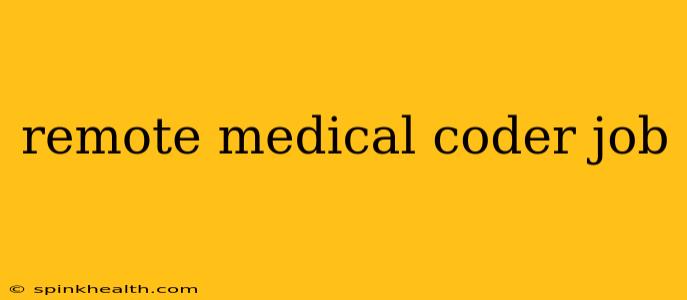The click of the keyboard, the quiet hum of your computer – this could be the soundtrack to your new career as a remote medical coder. Imagine a job that offers flexibility, work-life balance, and the chance to make a real difference in healthcare, all from the comfort of your home. This isn't a pipe dream; it's a rapidly growing reality for many medical coding professionals. But navigating the world of remote medical coding jobs requires understanding the landscape, knowing what to expect, and preparing yourself for success.
This comprehensive guide will walk you through everything you need to know, answering your burning questions and setting you on the path to landing your dream remote medical coding job.
What is a Remote Medical Coder?
A remote medical coder is a healthcare professional who translates medical diagnoses, procedures, and services into numerical and alphanumeric codes. These codes are essential for billing insurance companies, tracking patient care, and maintaining accurate medical records. The "remote" aspect simply means they perform these tasks from a home office, rather than a traditional office setting. They use specialized software and coding manuals (like the CPT and ICD-10 manuals) to ensure accuracy and compliance. It's a job that demands attention to detail, strong analytical skills, and a deep understanding of medical terminology.
How Can I Find Remote Medical Coding Jobs?
Finding the perfect remote medical coding job takes research and strategy. Start by leveraging online job boards like Indeed, LinkedIn, and Monster, searching specifically for "remote medical coder," "work from home medical coder," or "virtual medical coder." Don't be afraid to broaden your search to include terms like "telework medical coder" or "remote healthcare coding." Many companies are increasingly advertising their remote opportunities directly on their websites. Explore these company career pages directly for potential openings.
What Skills Do I Need to Be a Remote Medical Coder?
Beyond the obvious need for coding expertise, there are several crucial skills that will elevate your chances of landing and excelling in a remote medical coding job:
- Medical Terminology and Anatomy: A strong understanding of medical terminology is paramount.
- ICD-10 and CPT Coding: Proficiency in these coding systems is essential for accurate billing and reimbursement.
- HIPAA Compliance: Strict adherence to HIPAA regulations is crucial to protect patient privacy.
- Strong Attention to Detail: Accuracy is non-negotiable in medical coding.
- Exceptional Time Management Skills: Working remotely requires self-discipline and organizational skills.
- Proficient Computer Skills: You'll need to be comfortable using various software programs.
- Excellent Communication Skills: While working remotely, clear communication is key, especially when collaborating with colleagues and clients.
What Are the Benefits of a Remote Medical Coder Job?
The advantages of a remote medical coding job are numerous:
- Flexibility: Set your own hours (within reasonable boundaries, of course).
- Work-Life Balance: Spend more time with family and pursue personal interests.
- Cost Savings: Reduce expenses associated with commuting and work attire.
- Location Independence: Work from anywhere with a reliable internet connection.
- Increased Job Security: The demand for medical coders is constantly growing.
What are the Challenges of a Remote Medical Coder Job?
While remote medical coding offers significant advantages, it's not without its challenges:
- Isolation: Working from home can sometimes lead to feelings of isolation.
- Self-Discipline: Maintaining productivity and focus requires self-motivation.
- Technology Dependence: Reliable internet and computer equipment are essential.
- Potential for Distractions: Minimizing distractions at home is crucial.
What Certification Do I Need to Be a Remote Medical Coder?
While not always mandatory, obtaining a relevant certification (such as the Certified Professional Coder (CPC) or Certified Coding Specialist (CCS)) significantly boosts your credibility and marketability. These certifications demonstrate your competency and commitment to the profession, making you a more attractive candidate for remote medical coding positions.
What Software Do I Need for a Remote Medical Coding Job?
The specific software used will vary depending on the employer and the type of coding you perform. However, most remote medical coding jobs will involve using Electronic Health Records (EHR) systems and specialized medical coding software. Expect to become familiar with different platforms and software during your training and on the job.
This comprehensive guide provides a solid foundation for your journey into the world of remote medical coding. Remember, preparation, dedication, and a proactive approach will pave your way to a successful and fulfilling career.

